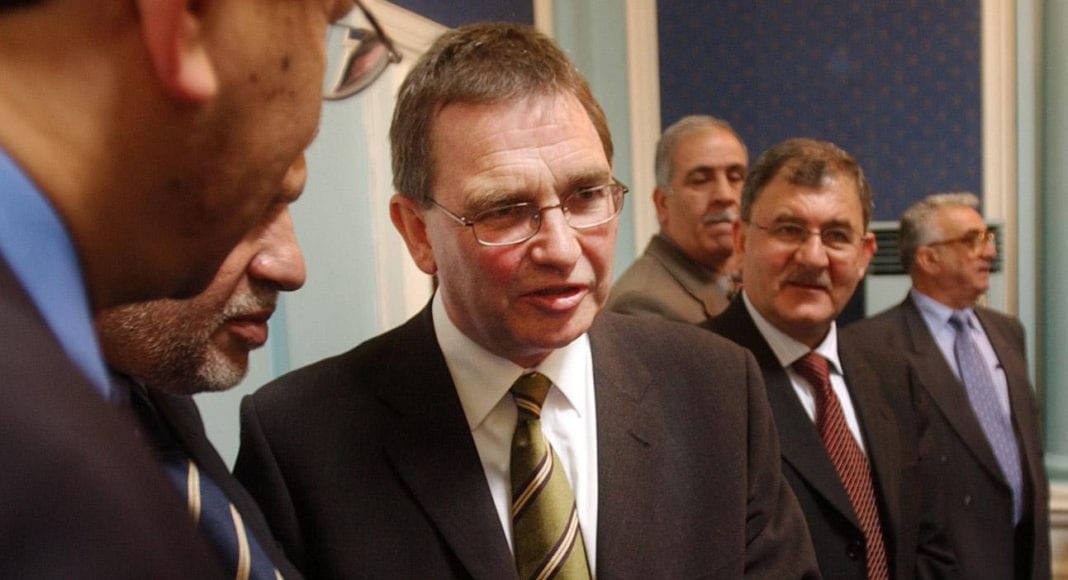If British companies and institutions do not give Guyana’s rapidly expanding oil and gas industry the support and massive experience they can contribute, then others will fill that void. This is the view of former U.K. Energy Minster and Prime Minister’s Special Representative on Overseas Trade, Brian Wilson.
Writing in an op-ed published this week in Energy Voice, Wilson said his interest in Guyana is very much long distance and is based on the fact it has the potential, one way or another, to be the classic case study of how and whether a small country can come to terms with the sudden arrival of the international oil industry.
“There is no shortage of precedents to that question and the answers have not always been encouraging,” Wilson points out. “However, the dichotomy between size of population and scale of resource is probably unique to the case of Guyana.”
With just 750,000 people in Guyana, he said a reasonable share of the wealth that is about to flow from its waters could give the population a comfortable, peaceful life for generations to come, “with quite a bit to spare.”
Since 2015, U.S. oil major ExxonMobil has found over 9 billion barrels of oil equivalent offshore Guyana in a massive block called Stabroek with an area covering 6.6 million acres. The country began producing oil in December 2019 and is expected to be catapulted to among the top three producers in Latin America before the end of the decade.
Reflecting on the recently concluded Aberdeen-Guyana Gateway event, Wilson said there is keen awareness of the need to build local supply chains in Guyana and also to partner with foreign companies which have relevant experience – a clear opportunity for the U.K. given historic links.
“Equally, there could hardly fail to be a keen awareness of how things could go horribly wrong with the blessing becoming a curse,” he said. “One does not have far to look for the example of how oil wealth can heighten inequality rather than eliminate poverty. Neighbouring Venezuela has had oil for more than a century and little good it has done the impoverished masses.”
In pointing out the well-known pitfalls, Wilson alluded to a Bloomberg article written by Mac Margolis, a Latin American specialist, who feared that the divisive nature of Guyana’s politics, based on ethnicity, was already threatening to turn opportunity into disaster. “Cronyism, graft and self-dealing have long made Guyana’s identity-driven politics a race to the bottom,” he wrote. “Unless Guyanese society holds its carping political establishment to a higher bar, South America’s breakout nation risks sabotaging a centuries-deferred vision of creating common wealth and democratic stability, and instead enriching only the oil behemoths.”
However, Wilson said he prefers to take the optimistic view – that Guyana is capable of coming to terms with its extraordinary new wealth, but also that it needs external assistance to do so.
“And that is where the U.K. should surely be rethinking its position on the ludicrous prohibition on support from the Department of International Trade for companies in the oil and gas sector, in which it has been followed by the Scottish Government,” he said. “Guyana’s oil industry is not going to shut up the shop it has just opened any time soon.”
The former energy minister said if British companies and institutions do not give the industry the support and massive experience they can contribute, then others will fill that void, “perhaps with less regard for the regulation, environmental and transparency standards by which our companies are bound by law. We should be proactively encouraging involvement in Guyana at this stage, not obstructing it.”
There is another reason for this, he pointed out. “Guyana has recently been going through terrible flooding. The country has been in the front line of dealing with the impacts of climate change. Much of the money that comes from oil will be used to fund its own energy transition to renewables. Should we not also be involved in all of that?”
Wilson said for the time being, outsiders can only hope that oil becomes a net blessing rather than a curse for Guyana.
“However, there is no need for Aberdeen, Scotland or the UK to be bystanders in that contest,” he reiterated.



